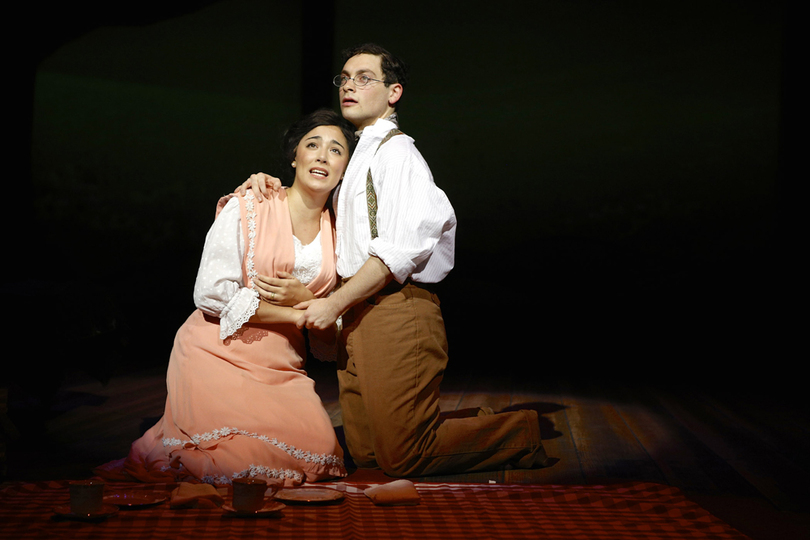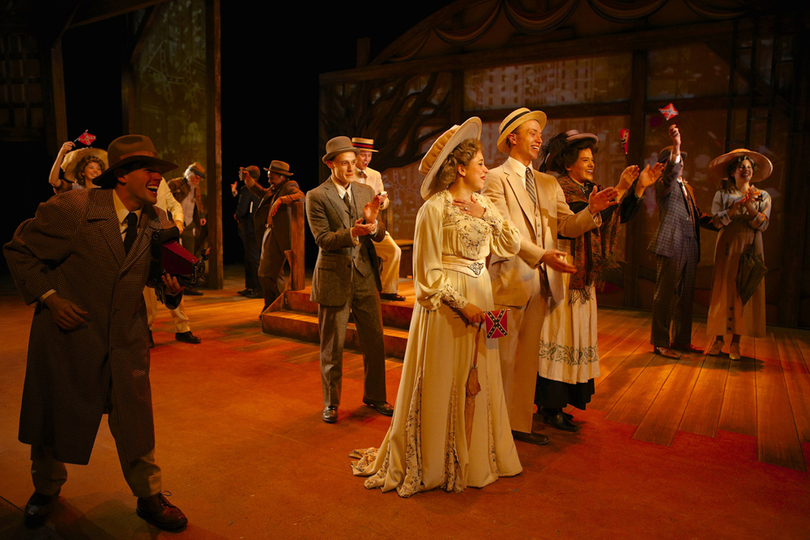SU Drama opens season with emotional performance of ‘Parade’
The lights dim, and the silhouette of a single soldier is seen playing a drum. For a minute or so, a steady drumbeat is the only audible sound in the room.
An underlying dark tone was set from the very first moments of the sold-out opening of “Parade,” Syracuse University Department of Drama’s first show of the season at the Syracuse Stage/SU Drama Complex on Saturday night.
The Tony-Award winning musical by Alfred Uhry and music and lyrics by Jason Robert Brown tells the story of Leo Frank, a Jewish man living in Georgia. The musical focuses on his indictment for the murder of a young girl named Mary Phagan and the growth of his relationship with his wife, Lucille.
Based on true events, “Parade” highlights the stereotypes against Jews and “Yankees” living in the South during the early 1900s, and how the events surrounding the trial eventually resulted in Leo Frank’s kidnapping and lynching.
Every single seat was filled as the audience waited in front of the empty stage. There were no fixed props onstage, as everything — cots, chairs, tables and platforms — was carried and moved by the actors themselves.
The only constant was the electronic backdrop projected through the framed structure surrounding the stage. The images changed back and forth between settings — a factory, an outdoor meadow and newspaper clippings of headlines — in accordance with the current scene.
The sound of sniffles could be heard across the theater multiple times throughout the musical as members of the audience wiped their tears during some of the most powerful and emotional parts, including the testimony of the mother of Phagan and Leo Frank’s statement to defend his name.
Ethan Saviet, a senior musical theater major, played the role of Frank and said his character is “very misunderstood” and that Frank doesn’t know how to love his wife, even though he clearly does.
“Everything that happens to Leo allows him to connect to his emotions and his feelings, which in turn opens him up to her and brings them so much closer,” Saviet said.
Ana Marcu, a junior musical theater major, said she did a lot of research to prepare for her role to compare the real-life Lucille Frank with the character presented to her in the play.
After she got the role, Marcu read the script numerous times as well as read a book entitled, “And Then The Dead Shall Rise,” a detailed account of the events surrounding Phagan’s death and Leo Frank’s lynching.
“I think the biggest thing for me was Lucille’s entire journey and how she starts out as this woman who has low self-confidence and has insecurities about her marriage,” Marcu said.
One turning point in the play is when the governor of Georgia, Jack Slaton, played by Tyler Jimenez, decided to reopen and reexamine the flawed trial and change Frank’s sentence from the death penalty to life imprisonment.
Jimenez, a senior musical theater major, said that he enjoys going through the transformation his character makes.
“He’s such a dynamic character from start to finish,” Jimenez said. “He started off not wanting to be a part of it, then significantly changing the outcome of it.”
Madie Polyak, a junior musical theater major, said the musical, particularly the second act, takes the audiences through an emotional journey. She said the ending, which reveals the interaction between Frank and Phagan, allowed the story to come full circle.
“The performances were so real, and it was spot on and incredible,” Polyak said. “It’s amazing to see how the people have come in the program in the past years and seen their work since Day One.”
As one of the lead roles, Saviet said he feels lucky to have worked on a play that affected people with the journey that the characters go through.
“I feel so fortunate to bring this piece of theater to life and to share it with people,” Saviet said. “It really is an important one that not many people know too much about it because of its dark nature, but I just feel very lucky to be able to work on it.”
Toward the end of the play, the steady beating of a single drum was again the only audible noise as the scene of Frank’s lynching began.
“Do you have any last words, Mr. Frank?” one of the characters asked him.
“Sh’ma Yisrael. Adonai eloheinu, Adonai echad,” Saviet sang in response, his voice shaky and afraid. Its translation: “Hear, O Israel. The Lord is our God, the Lord is one.”
Published on October 13, 2014 at 12:01 am
Contact Clare: clramire@syr.edu







